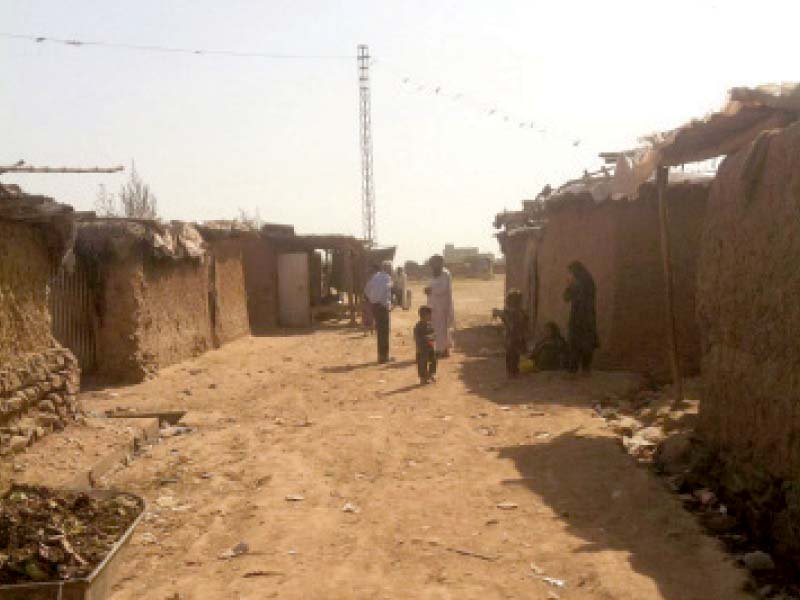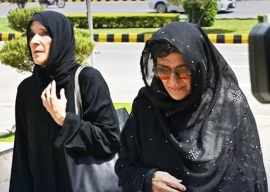
The settlement, supported by the UNHCR, provides shelter and stability to its residents.
Here, The Express Tribune met Abdul Jabbar Khan, a tribal elder, who fled Afghanistan 34 years ago with his parents, wife, and a one-year-old child.
Now, at 59, Pakistan has been his home for longer than Afghanistan ever was.
And yet, he and his Pakistan-born children and grandchildren are denied citizenship.
Although he does not openly begrudge the fact, it often came up during the conversation, especially in the context of the poverty refugee populations live in.
Pakistani law does not provide refugees with a route to citizenship, hampering their access to legal employment and basic services.
Khan says all legal refugees have a Proof of Registration (PoR) card without which they cannot travel freely, access healthcare, enrol their children in schools, or buy land.
Most private organisations prefer their employees to hold citizenship, thereby limiting employment opportunities for refugees.
When contacted, a Ministry of State and Frontier Regions (SAFRON) official said that there were no plans to change the policy.
“Even if they lived here for a hundred years, it would be impossible for them to get citizenship,” he said.
He noted, however, that Afghan refugees can access public and private education, and are allowed to work for any private organisation, as the official bar on employment is only in government sector jobs.
According to the UNHCR, Pakistan hosts around 1.6 million registered Afghan refugees and approximately a million undocumented refugees.
Of these, an estimated 34,860 refugees live in Islamabad; 63 per cent of whom are under the age of 24.
Despite UNHCR support, the living conditions here are pitiful. Water supply only for an hour a day, children only have access to informal education, with the local mosque also serving as a school, and no proper health facilities are available — the community uses donkey carts to move the sick to the road, from where they take taxis to the nearest hospital.
The situation is often worse in the smaller illegal refugee villages around the city.
After talking to some children from one of these villages, it was found that dozens of them earn a living by picking and sorting garbage in various parts of the city.
None of them go to school, because, they say, their families depend on the money they make.
Many of them also beg, while a few have picked up a drug habit amid life on the streets.
UNHCR says that 80 per cent of Afghan refugee children are not getting an education, especially girls.
“Because of prolonged security issues and the protracted nature of the refugee situation, Afghan refugee villages do not adequately benefit from the human and financial resources required to provide a minimum level of quality education,” a UNHCR official said.
But despite the problems, Khan is happy living in Pakistan.
He appreciates the bonds he and his community have forged with Pakistani people.
“We live here with dignity and respect, and suffer no violence,” he says.
After having lived here for more than three decades, his children and grandchildren have known no other home, much like many of the refugees. Most of these second and third generation refugees do not want to be repatriated.
Khan says his grandchildren even asked him, “What direction is Afghanistan in?”
Children at the local mosque did not even want to consider leaving.
Asmatullah is 15 and one of the 210 children studying there. He said that no one in his family talks about Afghanistan or going back.
“My life is here (in Pakistan). I want to spend it here,” he said.
But they worry that their futures in Pakistan are uncertain beyond June 30, when their stay extensions expire. The government has yet to announce a new policy for refugee management and voluntary return. According to international agreements, all refugees are expected to be eventually repatriated.
But the youth in the settlement are adamant that they do not want to leave. “We would rather die than leave Pakistan,” they say.
Published in The Express Tribune, June 12th, 2016.



1724152318-0/beyonce-(1)1724152318-0-165x106.webp)
1728213758-0/Tribune-Pic-(2)1728213758-0-165x106.webp)












COMMENTS
Comments are moderated and generally will be posted if they are on-topic and not abusive.
For more information, please see our Comments FAQ